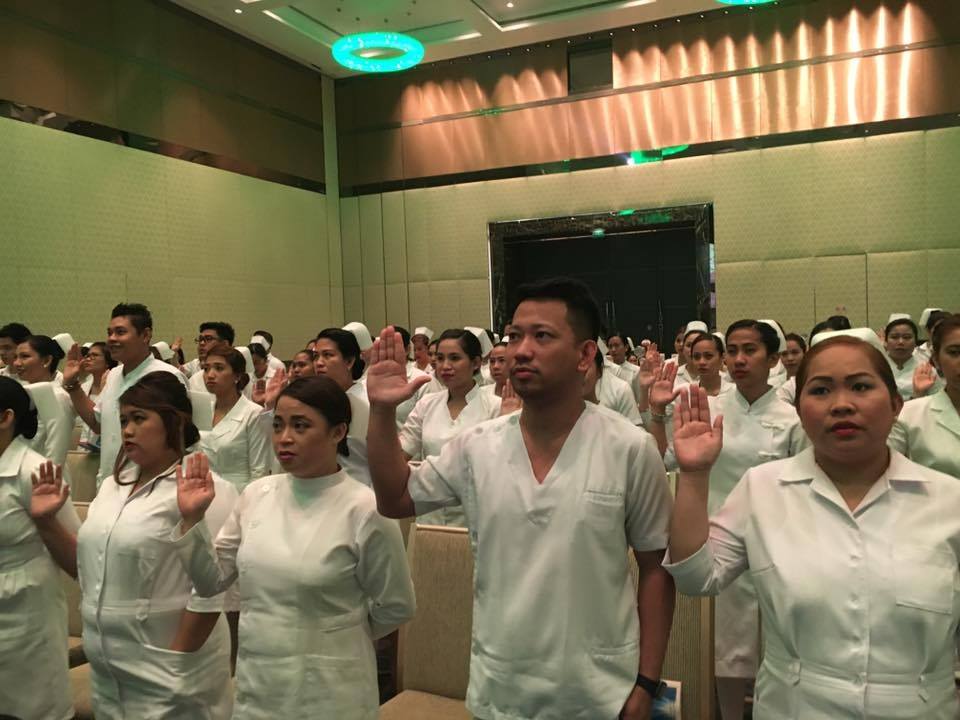News
US-based Pinoy cites Filipino nurses’ contribution to global health

FILE: Rev. Arnedo S. Valera, Esquire Executive Director and Migrant Heritage Commission (MHC) Chairperson, cited the role of Filipino nurses working abroad in his speech entitled “Nurses without Borders” at the Filipino Nurses Global Summit & 11th International Nursing Conference at the Blue Leaf Filipinas in Pasay City. (Photo: Department of Foreign Affairs Republic of the Philippines/Facebook)
MANILA — A US-based Filipino lawyer on Thursday cited the great contribution of some 200,000 Filipino nurses working in the United States to global health care and the millions of dollars of remittances they send back home that help boost the Philippine economy.
Rev. Arnedo S. Valera, Esquire Executive Director and Migrant Heritage Commission (MHC) Chairperson, cited the role of Filipino nurses working abroad in his speech entitled “Nurses without Borders” at the Filipino Nurses Global Summit & 11th International Nursing Conference at the Blue Leaf Filipinas in Pasay City.
Valera who is also the chair of the US Pinoys for Real Change in the Philippines (USPRCP), and is a pro-bono legal counsel of the Philippine Nurses Association of America (PNAA) and the Philippine Nurses Association Foundation of America (PNAAF), said that “at the turn of the 21st century, the Philippines became the single largest source of foreign nurses in the U.S., accounting for nearly 50 percent of all foreign nurses.”
Valera said Philippines is “the largest exporter of nurses globally, with roughly 25 percent of all overseas nurses worldwide,” adding that “about 85 percent of employed Filipino nurses work in more than 50 countries.”
Valera added that “Filipino nurses are better trained and reliable, (and) are generally competent in English, which is still the No. 1 global language, and have that unique quality of being caring and compassionate.”
Filipino nurses working abroad earn as much as 15 times more than their counterparts working in the Philippines, he said.
Valera added that Filipino nurses earn five times more than the average chief executive officer or lawyer in the Philippines.
Citing statistics, Valera said “Filipino nurses working abroad remit about USD1 billion or about PHP50 billion to the Philippines every year.”
“Along with other professionals and skilled workers in the US, they contribute nearly half of the 80 percent total remittances sent by overseas Filipinos from just nine countries (aside from the US are Canada, UK, UAE, Saudi Arabia, Singapore, Italy, Germany, and Hong Kong).”
“Remittances sent by overseas Filipinos comprise 13% of the Philippines’ Gross Domestic Product (GDP), with the total remittances increasing from $20 billion in 2011 to $21 billion in 2012. Remittances sent by overseas Filipinos keep the Philippine economy afloat,” he said.
Valera said when super typhoon Yolanda hit the Philippines that devastated Eastern Visayas, remittances sent by Filipinos working abroad helped in staving off the challenges at such a crucial time.
Chancellor for the Legal Relations for Asia/Pacific Int’l Commissions of Diplomatic Relations on Human Rights and Peace Inter-Governmental Organizations (IGO ICDRHP).
In his speech, Valera recalled the heroic act of a Filipino nurse when Hurricane Sandy hit the United States in 2012 as related by former US President Barack Obama during his address before the US Congress in 2013.
“We should follow the example of a New York City nurse named Menchu Sanchez. When Hurricane Sandy plunged her hospital into darkness, she wasn’t thinking about how her own home was faring…Her mind was on the 20 precious newborns in her care and the rescue plan she devised that kept them all safe,” said Obama.
Valera said “Menchu represented all Filipino nurses, who are highly-prized professionals around the world.” “Filipino nurses are valued not only for their outstanding skills, but also for their reputation for warm, tender care. They are trained in American-caliber healthcare field. They speak good English, in a field where communication is essential in life-and-death situations.”
“They are hard working. Indeed, they have a reputation for going out of their way to take good care of their patients. This is because Filipino nurses come from a caring culture, where families take care of their own sick and aging relatives,” Valera added.
“No wonder they have become a mainstay of many hospitals and nursing homes in the U.S. and many other parts of the world. They are recruited in their homeland with perks like free airfare. Some are offered thousands of dollars in bonuses to relocate,” he said.
“In the pursuit of their noble profession across the globe, Filipino nurses have been contributing to a better tomorrow for the Philippines and Filipinos, they have been serving as ambassadors of goodwill by enhancing the Philippines’ people-to-people relations with the U.S., a major ally, and with the rest of the world – and on a daily and sustained basis through the years, they have been performing a great and much-needed service to humanity.”
At the same time, Valera said the Philippines has become the biggest exporter not just of nurses but also of seafarers.
“The country supplies 27 percent or 350,000 of 1.2 million seafarers worldwide, as well as caregivers. The number of Filipinos living or working abroad now varies from 10 to 12 million. Filipino nurses, individually and as organizations contribute to nation building in many ways, and such contributions are significant because their impact is substantial and long-term,” he said.
Valera said that Filipino nurses in the US and other parts of the world have been rendering invaluable health services and care, saving lives and easing the pains of patients with their exceptional services and loving care. (PNA)





















